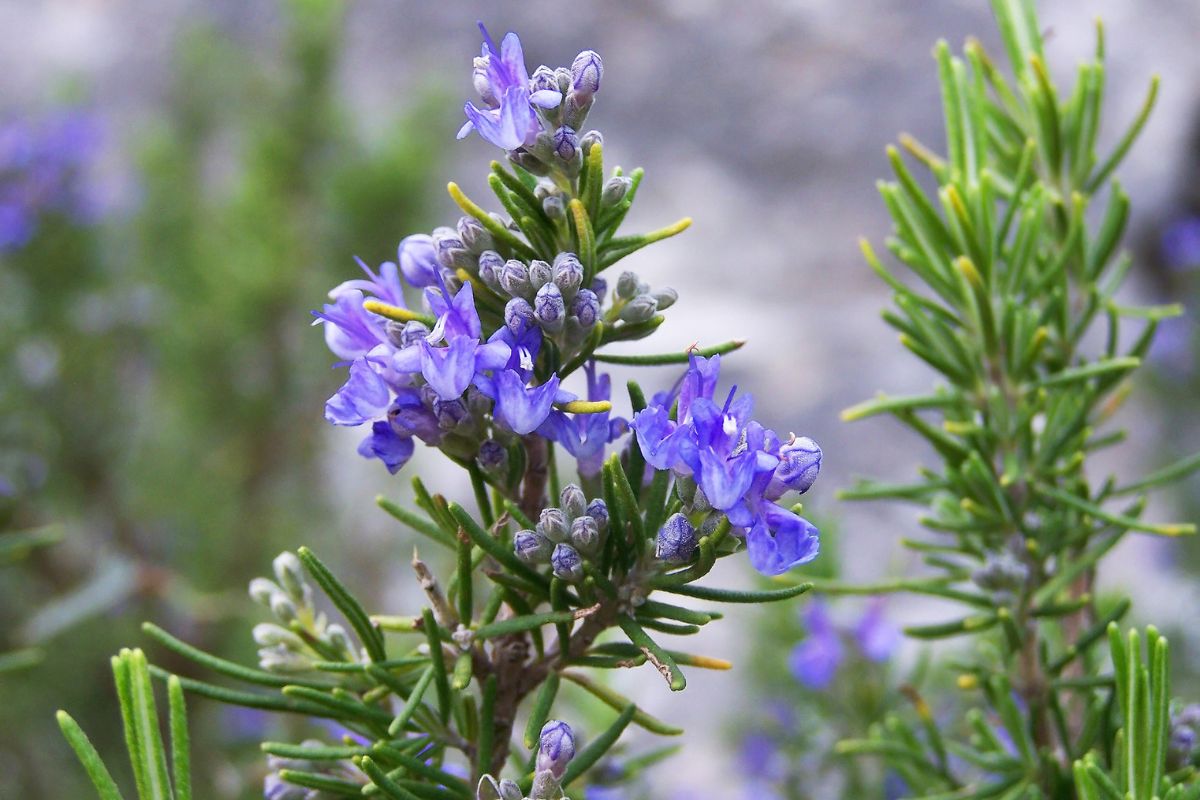Rosemary adds a warm, slightly bitter flavor to your dishes. You can use fresh or dried rosemary in small quantities to flavor soups, stews, and meat dishes. However, this herb is unsuitable for pregnant women, children under five, and people using certain medications like blood thinners.
Table of Contents
What is Rosemary?
Rosemary is an aromatic herb in the Lamiaceae or mint family alongside mint, oregano, basil, sage, thyme, and lavender. It was initially classified as Rosmarinus officinalis but is now categorized as Salvia rosmarinus.
| Origin | Native to the Mediterranean region of North Africa, Asia Minor, and southern Europe |
| Appearance | A perennial cluster of many stems that form an evergreen shrub |
| Flavor profile | Has a warm, slightly bitter, earthy, resinous, woodsy, minty, lemony, peppery, and piney flavor |
Origin
Rosemary is native to the Mediterranean region of North Africa, Asia Minor, and southern Europe. It grows well in other areas like the US, South Africa, Mexico, Canada, and India.
Mediterranean, Italian, Spanish, and French cuisines feature rosemary. People use the herb to flavor teas, lamb, poultry, oily fish, duck, pork, potatoes, baked goods, and vegetables.
Appearance

Rosemary grows as a perennial cluster of many stems that form an evergreen shrub. The woody stems are lined with many needle-like leaves, dark green tops, and pale undersides. The plants produce white, purple, pink, or blue flowers.
Rosemary leaves are used as a fragrant culinary herb, while the stems are discarded.
Flavor profile
Rosemary leaves have a warm, slightly bitter, earthy, resinous, woodsy, minty, lemony, peppery, and piney flavor. They have lingering undertones of sage and lavender.
Nutritional Benefits of rosemary
Rosemary has many health benefits:
- It contains vitamins A and C
- It contains minerals such as iron, manganese, and calcium
- It is a source of folate, niacin, pantothenic acid, riboflavin, and thiamin
The phytochemicals in rosemary may help lower the risk of asthma, enhance eye health, and boost liver function. Carnosic acid may also promote eye health.
Rosemary contains anti-inflammatory and antioxidant compounds that help neutralize free radicals and improve the immune system.
The carnosic acid in rosemary helps lower the risk of tumor formation and slows the growth of cancerous cells. Carnosic and rosmarinic acids have antibacterial, antifungal, and antiviral properties that promote better immunity.
What is rosemary good for?
In small quantities, rosemary is good for the following medicinal applications:
- Promoting hair growth when used externally as an oil
- Managing digestion problems when ingested
- In supplementation healthcare as powdered rosemary extract in capsules
- Improving memory when inhaled as rosemary essential oil or rosemary-infused water
- Lowering blood sugar since carnosic and rosmarinic acids have insulin-like properties
Who should not take rosemary?
Rosemary is potentially dangerous when ingested in excess or applied excessively as undiluted oil. The side effects include spasms, uterine bleeding, allergic contact dermatitis, kidney damage, sun sensitivity, vomiting, and miscarriage.
Because of its potential side effects, the following groups should not take rosemary:
- Women trying to get pregnant (the herb may alter hormones)
- Pregnant women and breastfeeding mothers
- Children below five years old
- People taking lithium drugs (rosemary might cause dehydration and concentration of lithium in the body)
- People taking diuretic drugs (rosemary is a diuretic and may cause extreme dehydration)
- People with Crohn’s disease, ulcers, ulcerative colitis, and high blood pressure
- People using blood thinners (rosemary may cause excessive bleeding)
- People taking anticonvulsant drugs (rosemary may worsen seizures)
- People with iron deficiency or those taking iron supplements (rosemary limits iron absorption)
- People allergic to aspirin and those using aspirin (rosemary contains salicylate, which is also found in aspirin. Using the two together may lead to overdosing)
Can you eat fresh rosemary?
You can eat fresh rosemary by cooking it in dishes such as chicken, lamb, potatoes, vegetables, and seafood. Some people eat fresh rosemary leaves right off the plant. You’ll find that they are more bitter when eaten this way.
Can I boil rosemary and drink it?
You can boil rosemary and drink the water after straining out the leaves. Boiling the fresh or dried leaves in water makes them more bitter.
The best way to make rosemary tea with intense flavor, aroma, and nutritional value is to boil water and pour the leaves to steep for five minutes.
Alternatively, add the leaves or sprigs of rosemary to water and bring them to a boil, then lower the heat and let them simmer for 1-3 minutes.
Can I keep planted rosemary indoors or outside?
You can keep planted rosemary indoors or outdoors. Plant your rosemary cuttings in well-drained soil in pots or direct in a herb garden.
If you live in a colder area, grow your own rosemary plants indoors, especially during winter. Rosemary plants are drought tolerant and thrive outdoors in full sun in warm climates.

